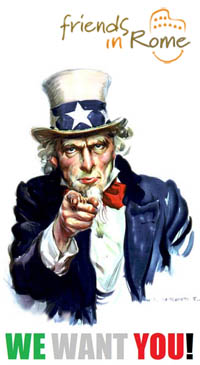4/15/2010 by Patrizia Notarnicola Italy
International Voice meets Tetyana Kuzyk, delegate of the mayor of Rome, for the integration of immigrant communitiesAfter the interest born on this blog about immigration and integration, International Voice interviews a woman who is involved every day in foreignersí integration in the capital of Italy. She is Tetyana Kuzyk, a Ukrainian journalist and English teacher. She has lived in Rome for ten years. For two months she has been the delegate of the mayor of Rome for the integration of the immigrant community. Tetyana is one of the four "advisers added" by the Municipal Council, sheís been elected by non-EU foreign national residents, those living in Italy to pursue their studies and those who are here for professional reasons.Tetyana, you have a difficult job: help foreigners to integrate in Rome. But how is it possible to realize a true integration? Integration is the mutual understanding between foreigners and Italian people. Itís not only the individual coming from abroad who has to adapt to integrate into the Italian society, but the Italian society too has to integrate him, accept him, and there should be a change of behaviour after this new presence. Itís a process of meeting and change from both sides. We live in a complex society. Each one of us, Italian or foreigner, European or not, needs help to achieve this path. What are you doing to achieve this goal? First of all, we would like to create a network of communication and information. The City of Rome has a great experience to work with immigrants, but all the initiatives undertaken have not been communicated to the society. Itís time to do so. For example, on the website www.comune.roma.it, we will have a space dedicated to all laws and initiatives in this field. It is only through the analysis of this material that we can realize a real picture of the situation of immigration in Rome. It isnít an easy task because we have to set up a mechanism in Italy, something that started 10-15 years ago in other countries. Somehow, the Italian society has got blocked, unlike many other societies in the globalized world. To change, we should be given more information about each foreign community and this can be done through the media. For example: a party organised by the Ukrainian community to celebrate the Ukrainian independence, would not be meaningless if Italians were present.Many International Voice readers come from countries outside the European Union (USA, Canada, Brazil and others). On our blog they have told us of their problems with Italian bureaucracy and their integration. However they have the impression that there is a division between " Series A and Series B immigrantsĒ. What do you think? When a Ukrainian immigrant and an American meet, they donít have the feeling to be of Series A or Series B. They feel equal. Let me give an example. When I arrived in Rome ten years ago, I spent my first 8 March (Women's Day) with a group of American women, because I knew the English language better than Italian. It was easier to buy a magazine in English and go to this event with my friends. There I realized we have a lot of things in common: the type of life, the difficulties of integration and communication, the problems of bureaucracy and work. But I know that the relationship between an Italian and an American is very different from the relationship between an Italian and a Ukrainian. The Italian society divides foreigners just as much as the world itself is divided: rich, third world and developing countries. Are Italian public officials working in immigration offices influenced by this worldís vision? Many officials donít have the adequate training. They have a prejudice, a fear that comes from ignorance. Integration is a constant everyday change of mentality and of cultural level. At the police station, the prefecture, the airport, the customs, everywhere, officials should think of welcoming "people who come from another part of the world", not "foreigners". We can start with a Ďfriendly counterí, where foreigners can get information on the residence permit at the post office. I believe that employees should be trained on issues related to immigration and cultural mediation. They must attend an "integration course" Can we have a real integration in Rome? Even in Rome, as elsewhere in Italy, we have to start to "study". Two people, before getting married, what do they do? They try to know each other very deeply. Italians and non-Romans must live together, and then we have to know, study the history and social customs of each other. Many foreigners come to Italy just to earn and send money to their families. They donít want to know their new country. But in the globalized world, only those who study and work to overcome cultural barriers, will go on really. Integration is an endless journey. After ten years in Rome, do you feel integrated? And do you feel "Italian"? There's a book called "foreigner forever." I hope to remain a foreigner forever, I donít want to lose my identity. I was born into a mixed family. My father is Ukrainian, my mother comes from a Russian family. But today, I even think in Italian most of the time. I can say that Iím an integrated foreigner for all mental and psychological effort, sacrifice, study and work that I have put at the base of my commitment. Itís an adrenalin that I canít stop.thanks to Cynthia Jennifer for the translation contribution



4/15/2010



4/15/2010
